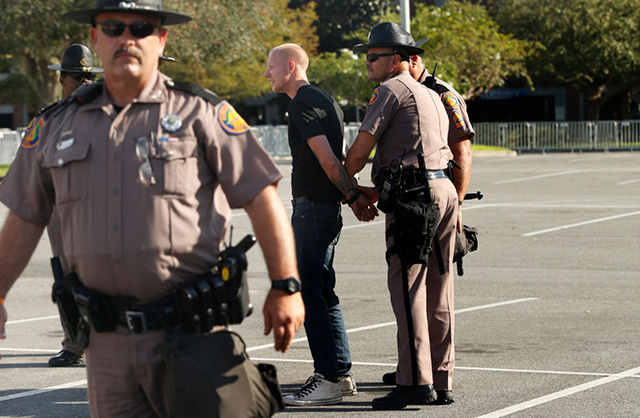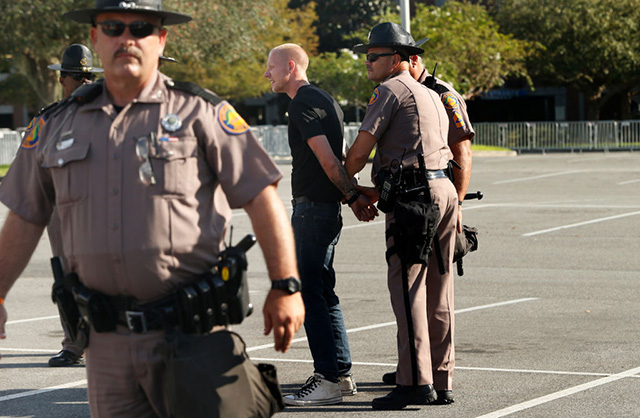
Did you know that Truthout is a nonprofit and independently funded by readers like you? If you value what we do, please support our work with a donation.
 White nationalist Tyler Tenbrink of Houston, Texas, is handcuffed by Florida Highway Patrol troopers at a speech by white supremacist Richard Spencer at the University of Florida campus on October 19, 2017, in Gainesville, Florida. Tenbrink was later arrested, along with friends William Fears and Colton Fears, as suspects in a shooting following the speech. (Photo: Brian Blanco/Getty Images)
White nationalist Tyler Tenbrink of Houston, Texas, is handcuffed by Florida Highway Patrol troopers at a speech by white supremacist Richard Spencer at the University of Florida campus on October 19, 2017, in Gainesville, Florida. Tenbrink was later arrested, along with friends William Fears and Colton Fears, as suspects in a shooting following the speech. (Photo: Brian Blanco/Getty Images)
“When I see these people on the roofs,” said University of Florida (UF) student Ebony Love, gesturing to the groups of snipers on nearby campus buildings, “I understand the reason why they’re up there, but at the same time, you have to take my money and pay for that, but I couldn’t get an escort to walk me to my classes, and you said you were going to post security outside these classes and you didn’t.”
When I talked to her, Love was leaning on a police barricade set up outside of the auditorium on campus where prominent white supremacist Richard Spencer was due to speak on October 19. The night before, however, Love was escorting a student to an 8 pm exam. She and another student sat watch outside for two hours in lieu of the campus security she said the university had promised but failed to provide.
Sacrificing Safety
Across the country, the education and safety of students is being sacrificed for the sake of accommodating a few well-financed bigots sowing an atmosphere of divisive aggression on college campuses. Security budgets for these events range upwards of $500,000, but few students and residents of the nearby community feel protected — and often feel greatly encumbered.
“We can’t carry backpacks,” lamented a graduate teaching assistant at UF who wished to remain anonymous given the precarity of his position. “Buses aren’t functioning. Kids can’t park to even come to campus.” A layered police perimeter about a mile in diameter prohibited traffic and enforced a restrictive list of banned items. In addition to various weapons, common items students might carry to class such as water, cigarettes and any sort of bag were prohibited, raising concerns that police were icing out street medics.
Despite the presence of police and physical barricades, one man was arrested at the protest site beyond two police checkpoints with an openly holstered handgun. Later that night, shots rang out from a car full of three Nazis who were antagonizing pedestrians less than a mile away. One person was injured and the Nazis were arrested.
If Richard Spencer’s goal was to have his message heard and respected, at University of Florida, it was an abysmal failure. A group of counter-protesters outnumbered the presence of his supporters inside the auditorium, chanting anti-racist slogans over Spencer’s exasperated attempt to deliver his speech. He alienated members of the press with reportedly racist screening processes.
In the lead-up to the event, logistics were in constant flux. Initially, the university was handling ticket distribution a week prior to the event. A local brewery launched a campaign to exchange free beer for event tickets they promised to destroy. The National Policy Institute, Spencer’s think tank, secured distribution rights for the tickets and moved the date twice, distributing all the tickets at the door on the day of the event.
If, however, Spencer sought to seriously disrupt campus life and the lives of those whom he denigrates through a fear of imminent racial violence, his event was wildly successful. Bobby Mermer, the bargainer with the Graduate Assistants United union and teaching assistant in political science, said that this chilling effect on the educational environment of the university was widely felt. “I have students who have left town, been pulled out of Gainesville altogether by their parents,” Mermer said.
“[Graduate assistants] in particular, along with faculty, have had difficulty managing what they were going to do today with classes,” Mermer continued. “We’ve had to move around a lot of our curriculum. There’s worry that we might not be able to cover all the curriculum we’re supposed to cover in the semester because of this disruptive speaker.” He told me he had to cancel two sections of the class he was teaching, affecting 50 students altogether.
When I talked to him on October 18, Paul Ortiz, vice president of the United Faculty of Florida union, reported similar stories: “I’ve talked to parents who have called me [and] expressed concern, who have said they’re pulling their children out of classes not just this Thursday, but the whole week. They’re reassessing whether they want to continue having their students enrolled in the University of Florida.”
Threats Targeting Individuals
Apparently aware of the hostile environment Richard Spencer’s speech created, the University of Florida allowed some faculty, students and staff to take the day off. Those who wished to take the day off were required to register an appeal with a superior (faculty to the dean, students to the instructor, staff to their supervisors), which was then assessed on a case-by-case basis. A similar policy was enacted at Auburn University when Spencer spoke there in April.
“What leg would anyone have to stand on if everybody in the class said, ‘I feel threatened and afraid to come to class. I can’t come’?” said Malini Johar Schueller, a professor of English at University of Florida. “Effectively, that’s a disruption of all the classes.”
At the University of California at Berkeley (UC Berkeley) last September, professors were moved to boycott holding classes during what was originally slated to be a series of right-wing speakers billed as “Free Speech Week.” In a petition signed by over 100 professors, boycotters explained that they were motivated by a pattern of violence from a newly galvanized far right, including a shooting at the University of Washington outside of a speech by professional fascism launderer Milo Yiannopoulos and the torch-lit beating of nonviolent protesters at the University of Virginia led by Richard Spencer.
In advance of his speech at UC Berkeley, Yiannopoulos posted screenshots of student senator Juniperangelica Cordova-Goff’s Facebook page to his Instagram account, stoking his followers to harass, threaten and doxx her. Doxxing, the practice of centralizing and disseminating someone’s personal identifying information, is designed to make an individual and their loved ones vulnerable to stalking, “swatting” (calling a SWAT team to someone’s house) and identity theft. In a statement released on her Facebook page, Cordova-Goff said, “The theoretical debate of free speech on campus has turned into a platform that is being used to target individuals who are organizing for a safer campus environment; a situation that could have been, and should have been, prevented by the university itself.”
For Yiannopoulos, this is a pattern of behavior. In December of last year, during his “Dangerous Faggot” tour, he stoked the audience at the University of Wisconsin-Milwaukee against a transgender student. On that same tour the previous April, he targeted Noa Leibowitz, a trans student organizer at American University. The day before his speech, Milo tweeted an article about the protests, sparking his followers to doxx Leibowitz in the comment section. Almost immediately, the threats poured in.
“Even months after the Milo protest,” Leibowitz recalled, “I still had Twitter beef with Milo. He would still tweet at me occasionally.” The event, held during finals week, put pressure on Leibowitz’s studies. They missed a final that their instructor let them make up.
“It kind of threw me into a mental-health spiral doing all this stuff,” Leibowitz said. “Getting all these death threats really put me in a weird position.” When they returned for the next semester, their trauma led them to submerge themselves in campus activism at the expense of their education, they said. Their grades suffered, and they took medical leave for two semesters to receive outpatient mental health care. They are preparing to return for the spring semester.
Counter-Recruitment on the Rise
The lasting effects of far-right events on campus sometimes extend beyond consequences for counterprotesters. At Texas A&M, where Richard Spencer spoke last fall, a clandestine white chauvinist student group formed, occasionally posting flyers around campus. Adam Key, who co-founded BTHO Hate to oppose Spencer, recalls the rhetoric: “There was a bunch of ‘the goyim know’ that I had to look up what that meant, but it’s something the ‘alt-right’ say about Jews.”
As of October 17, the Southern Poverty Law Center has tracked 329 instances of nationalist flyering at 241 different college campuses in the US since March 2016. The uptick in flyering corresponds with the subject of an article published on Spencer’s site, just a day before his University of Florida appearance.
The article, titled “We’re Not In Weimar Yet,” calls for focusing on recruitment, and does not deny that the ultimate aim is sustained street fights with the left. It should perhaps also be noted that the article was written anonymously under the pseudonym J. Evola – an apparent reference to mystical anti-Semitic monarchist Julius Evola who critiqued his contemporary Mussolini for not being right wing enough.
Meanwhile, some university administrations have demonstrated a willingness to protect this type of speech at the expense of everyone else’s. Presidents and administrators have tacitly or openly supported efforts to hold alternative events to divert students away from the venue of the speaker. Each Spencer appearance had its own hashtag-titled diversion event. At A&M, it was #AggiesUnited. At Auburn it was #AuburnUnites. At University of Florida it was #TogetherUF. Many activists feel these tactics merely represent further accommodation for those who seek to make campus unsafe.
“The university was hamstringing our efforts at getting information out about the event the entire time,” an anonymous Auburn University student organizer who tweets at @no_nazi_auburn told me in a phone interview. He recounted stories of the university removing their flyers, power-washing their chalk messages, and leaving students to fend for themselves on the day of the event.
“As they showed at UF, if you have enough people there saying, ‘We refuse this,’ they can’t do anything,” he said, referring to the threat of the attendees of Spencer’s talk who have been known to brandish weapons against their targets. He explained that his role was to contain those attending Spencer’s talk that might be motivated to harm his fellow students.
@no_nazi_auburn also reported the presence of Nazi flyers around campus. His crew is committed to stopping their recruiting efforts. “People don’t realize the White Student Union is still here because we take all their flyers down, but they’re still here and they’re still active.”
At UF, where the presence of opposition to Richard Spencer was overwhelming both outside the event hall as well as inside, students reported no evidence of fascist organizing afterwards. “Literally nothing; it’s wild. No flyers anywhere,” reported a student organizer with No Nazis At UF, which coordinated the protest against Spencer. “Campus has returned completely to normal. It’s really weird, but good I guess.”
Media that fights fascism
Truthout is funded almost entirely by readers — that’s why we can speak truth to power and cut against the mainstream narrative. But independent journalists at Truthout face mounting political repression under Trump.
We rely on your support to survive McCarthyist censorship. Please make a tax-deductible one-time or monthly donation.